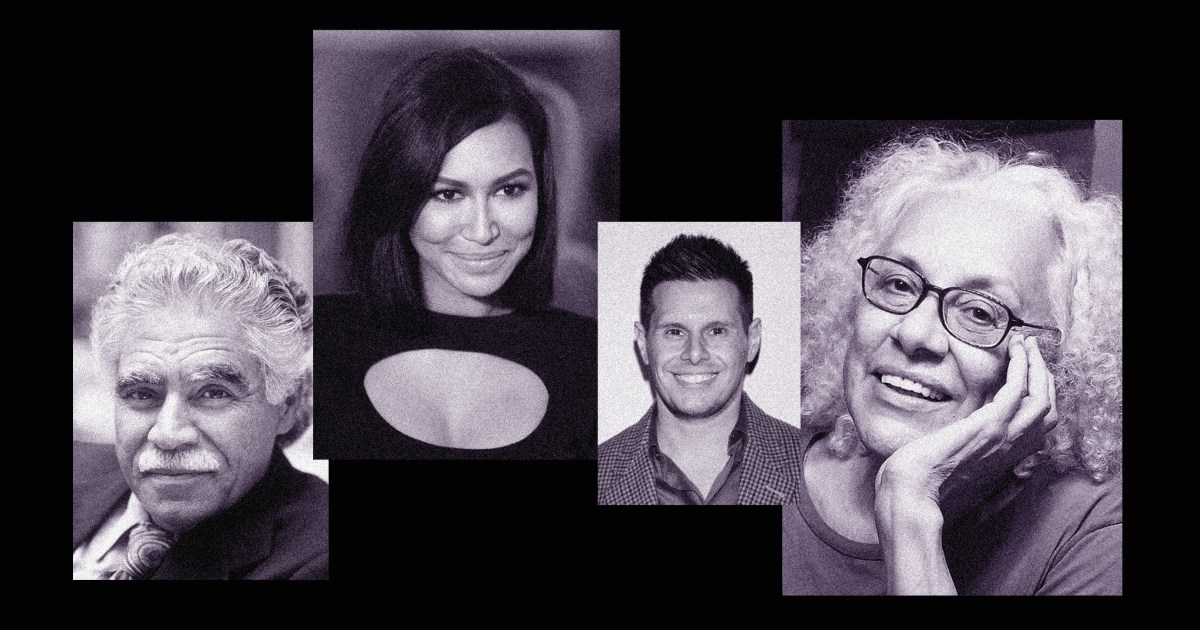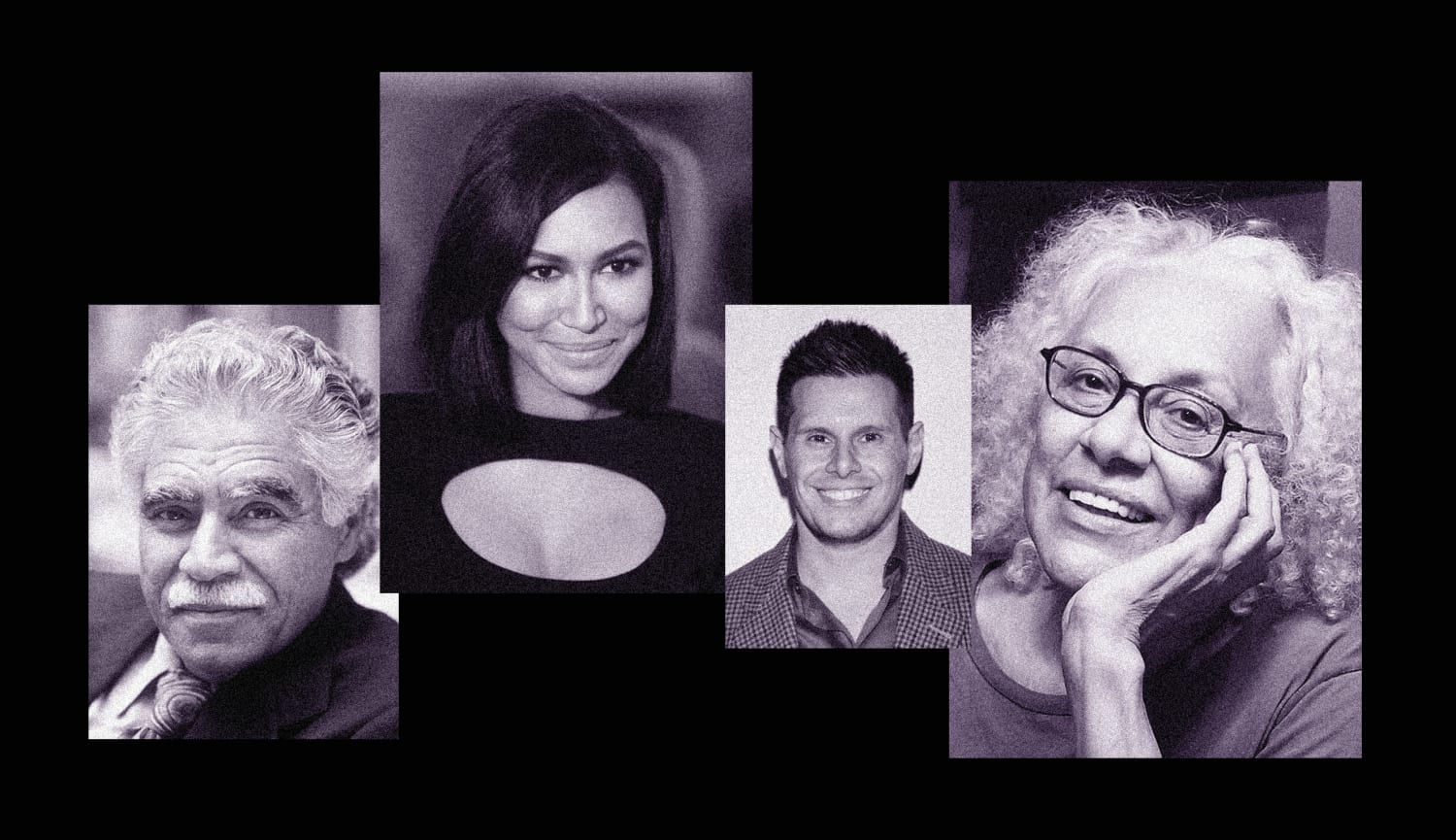
2020 has been a year marked by grief and loss, but it is in the spirit of remembrance, not sadness, that we highlight the lives of several Latinos we said goodbye to this year. From Hollywood to Washington, from academia to the armed forces, these are just a few of our “familia” who enriched our communities, our lives and our nation before leaving us.
RUDOLFO ANAYA, 82, a “godfather” of Chicano literature. Anaya is best known for his novel “Bless Me, Ultima” (1972), a coming-of-age story set in 1940s New Mexico. “Ultima” follows the relationship between a young boy and a curandera (healer) who comes to live with his family. A bestseller at a time when U.S. Latinos were rarely depicted in mainstream fiction, it has become one of the most acclaimed works in the Chicano literary canon. “Ultima” inspired generations of Latino writers, and it was adapted into a play, an opera and a film.
“Books like ‘Ultima’ are part of our personal reading history. Because they are taught in schools, we don’t forget seeing ourselves on the page for the first time,” writer and critic Rigoberto González said. “Seeing names like ours, and figures that are familiar to us, is powerful.” González said he believes “Ultima” will continue to have longevity in libraries and schools and on bookshelves.
Anaya, a prolific author who wrote mysteries, children’s books and travel chronicles, received the National Humanities Medal from President Barack Obama in 2016 for his “pioneering stories of the American Southwest.”
NAYA RIVERA, 33, actress and singer. Condolences poured in from around the world when news broke of the drowning death of Rivera in July. “As a Latina, it’s rare to have rich, complex characters reflect us in media,” Rep. Alexandria Ocasio-Cortez, D-N.Y., tweeted. “Naya worked hard to give that gift to so many.”
Rivera performed throughout her childhood, but it was her role on TV’s “Glee” (2009-15) that catapulted her to fame. Rivera, an advocate for the LGBTQ community, for immigrants and for women’s rights, earned three American Latino Media Arts Awards for her acting and singing. In 2016 she released her memoir, “Sorry Not Sorry: Dreams, Mistakes, and Growing Up.”
“She was the rare Afro-Latina on network TV, and when her character came out as gay, it was a historic moment for LGBTQ representation in prime time,” entertainment journalist Jack Rico said. Pointing out that 22 percent of Latino millennials identify as LGBTQ, Rico called Rivera’s portrayal of cheerleader Santana Lopez “groundbreaking,” saying it paved the way for queer characters on shows like “One Day at a Time” and “Vida.”
Rico said he believes Rivera died on the cusp of another career resurgence. “I could see true stardom in her. When people die young it really hurts, because we lose them and also their potential,” he said. “She was a guiding light for all of us struggling for more diversity and representation.”
VANESSA GUILLÉN, 20, U.S. Army soldier. Guillén, a daughter of Mexican immigrants, was born and raised in the Houston area. She was an avid athlete in high school and joined the Army after graduation.
In April, Guillén went missing from Fort Hood, Texas, where she was stationed. Frustrated by what they saw as a lack of response by the Army, her family launched a public campaign to draw attention to Guillén’s case. Lawmakers, celebrities and Latino advocacy groups joined their cause, and a video of Guillén’s mother pleading for military officials to help find her daughter went viral.
In July, Guillén’s remains were found; authorities alleged that she had been killed by a fellow soldier and an accomplice.
“It is shocking and disappointing that the Army did not initially take her disappearance more seriously,” said Domingo Garcia, national president of the League of United Latin American Citizens. “Guillén’s death led to a national ‘Me Too’ movement of women in the military coming forward to tell their stories of sexual harassment.” After an investigation, the Army fired or suspended 14 Fort Hood leaders and initiated reforms of military policy. The Army also posthumously promoted Guillén from private first class to specialist.
PATRICK HIDALGO, 41, former White House official. Hidalgo, the youngest of five in a Cuban American family, was an entrepreneur and political organizer with degrees from Georgetown, MIT and Harvard. After working as Obama’s Hispanic vote director in Florida in 2008, he was appointed to positions in the Obama White House. He later served as an adviser during the administration’s historic opening of relations with Cuba.
More recently, Hidalgo co-founded the Miami Freedom Project, a nonprofit dedicated to creating a space for progressive voices in Miami. “Patrick understood that this work was difficult,” said Ana Sofia Pelaez, another co-founder. “But he understood the pain and trauma, especially among Cuban Americans, that made it difficult. He saw an opportunity for healing in Miami and for helping people expand what they thought of as their community.”
His cause of death was originally reported as heart disease, but Hidalgo’s family believes he died from Covid-19.
“Patrick had a genuine openness to everyone and everything,” Pelaez said. “He lived with such purpose, and that drew people to him. And he was never about what he had done. Instead, he was all about what we, what people, could do together in the future.”
SILVIO HORTA, 45, co-creator of TV’s “Ugly Betty.” Horta, a first-generation Cuban American writer/producer, achieved his biggest success by adapting a Colombian telenovela into ABC’s comedy-drama “Ugly Betty.” The show ran for four seasons, made America Ferrera a star and received numerous accolades, including a Peabody Award.
Hailed for its positive portrayal of a working-class Mexican American family, the show tackled issues like immigration, grief, body image and sexual identity. While millions of viewers rooted for the irrepressible Betty Suarez (Ferrera), Horta said in 2007 that he saw himself in the character of Justin, Betty’s nephew, who came out in the show’s final season.
“I will always be grateful to him for how he wrote our characters, with such grace and nuance,” said actor Tony Plana, who played the Suarez family patriarch. “He brought a wonderful personality, gentleness and spirit of collaboration to the work. His loss was tragic. He was so talented and had the potential to create so much more.”
The Miami-Dade County medical examiner said Horta died by suicide. In a statement, his family said: “He was a kind and beautiful man. He may be gone but his light will shine on.”
JUAN GÓMEZ QUIÑONES, 80, Chicano studies scholar and activist. Quiñones, who was born in Mexico and raised in Los Angeles’ predominantly Latino Boyle Heights neighborhood, taught history at UCLA for nearly 50 years. There, he mentored, challenged and inspired generations of students, many of whom went on to careers in politics, public service and education. Quiñones, a former director of UCLA’s Chicano Studies Research Center, served on the board of the Mexican American Legal Defense and Educational Fund, as well.
In a statement, California Gov. Gavin Newsom praised Quiñones for “his pioneering work in the field of Chicano Studies and for pushing the boundaries in our understanding of California’s Mexican American communities.”
Alvaro Huerta, a former student who is now an associate professor at California State Polytechnic University, Pomona, said: “He was tough on us in class, because he wanted to prepare us for what we would face later in our careers. He was a rigorous teacher, but he also had a very compassionate side.”
Huerta added that Quiñones believed that it was important for Latinos in academia to stay connected to their roots; for decades, he supported and participated in student activism.
“Quiñones was among the first wave of Chicanos to move into higher education,” said Huerta, who knew him for 35 years. “Through his scholarship and mentorship, he dedicated his life to uplifting Mexicans and Mexican Americans.”
MIRIAM JIMÉNEZ ROMÁN, 69, Afro-Latina scholar. This year, the protests over the death of George Floyd in Minneapolis police custody brought renewed attention to racism and colorism within the Latino community. Yet Jiménez Román had been researching and discussing such issues for decades. Jiménez Román co-founded and was executive director of the Afro-Latin@ Forum, a collective that advocates for Afro-Latinos, and in 2010, she co-edited The Afro-Latin@ Reader, a landmark exploration of the U.S. Afro-Latino experience.
“She was at the forefront of connecting the African diaspora with latinidad,” or Latino identity, said her friend and colleague Josué Perea. “She was ahead of her time in contributing to the scholarship in this field.”
Jiménez Román also worked to bridge the gap between academia and the broader public. “Whenever we planned an event or a conference, she always tried to include music or food so everyone would feel welcome,” Perea said.
Jiménez Román, who was originally from Puerto Rico, grew up in New York City’s Spanish Harlem and later taught at Columbia, Brown and New York universities. “I think Miriam would like to be remembered as a woman of the people. She was very committed to equality and equity in everyday life,” Perea said. “She treated everyone with respect. She would talk to an academic expert the same way she talked to someone at the bus stop.”
SORAYA SANTIAGO, 72, transgender trailblazer. Santiago’s father used to take her to boxing matches in their native Puerto Rico in hopes of somehow making his child more masculine. But Santiago always knew who she was — and eventually she got the papers to prove it. With her mother’s blessing, Santiago had gender reassignment surgery in New York City in 1975. When she moved back to the island, she was the first person there to publicly acknowledge having transitioned. In another first for Puerto Rico, she later successfully petitioned a court to change her name and gender on her birth certificate.
Santiago, who owned a hair salon, lived openly during a time of near-zero transgender visibility. That required courage because of the homophobia and violence that still affect Puerto Rico’s LGBTQ community.
“‘Fearless’ is the best word to describe her,” her friend Pedro Julio Serrano said. “To do what she did in the ’70s, you had to be fearless. She followed her own path.”
In 2008, Santiago was the first openly trans person to run for public office in Puerto Rico. In 2014, she published her memoir, “Hecha a mano” (“Made by Hand”). And in 2019, she earned a bachelor’s degree from the University of Puerto Rico.
“She lived her life with such dignity that people just respected her,” Serrano said. “She was charismatic. Wherever she went, everybody noticed.”
TRINI LOPEZ, 83, singer and songwriter. As a young boy in Texas, Lopez was thrilled when his father bought him an acoustic guitar from a pawnshop and taught him how to play it. Lopez went on to a storied career in the 1960s, rubbing elbows with some of the most famous people of his era. He was discovered by Buddy Holly and mentored by Frank Sinatra, and he developed a friendship with Elvis Presley. He even co-headlined with The Beatles, in Paris, before their U.S. debut.
Filmmaker P. David Ebersole, who recently completed a documentary about Lopez, confirmed to The Associated Press that Lopez died from Covid-19 complications in August.
Among his worldwide hits, Lopez was known for his versions of “Lemon Tree” and “If I Had a Hammer.” “He was one of the first Mexican Americans to break into the mainstream,” singer/songwriter Mark Guerrero said. “He was huge.”
At a time when Latino artists were often pressured to adopt Anglo names, Lopez embraced his roots. “I’m proud to be a mexicano,” he told The Seattle Times in 2017.
Lopez acted in TV shows and movies, and his music was used in many films, as well. “He was able to take the folk music that was popular during the 1960s and Latin-ize it, spice it up,” Guerrero said. “He was very charming and had a lot of charisma. He was a great entertainer.”
Follow NBC Latino on Facebook, Twitter and Instagram.
Source: | This article originally belongs to Nbcnews.com










